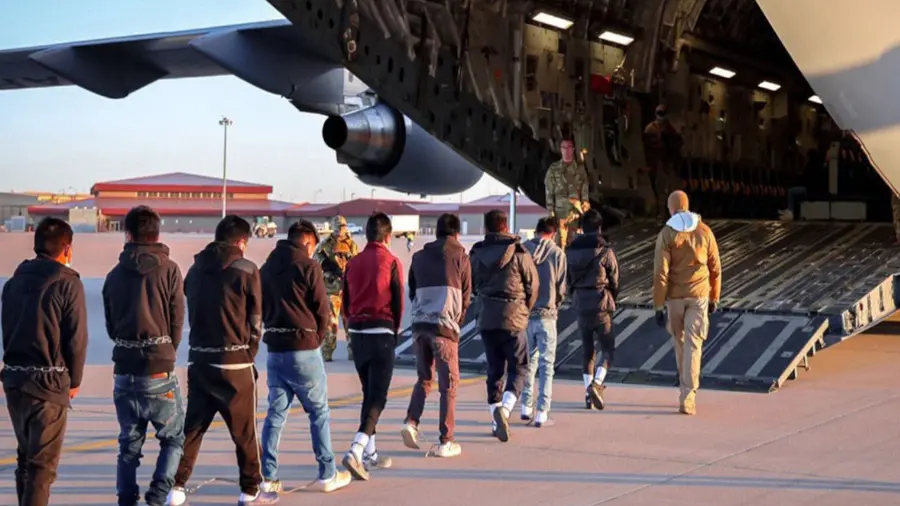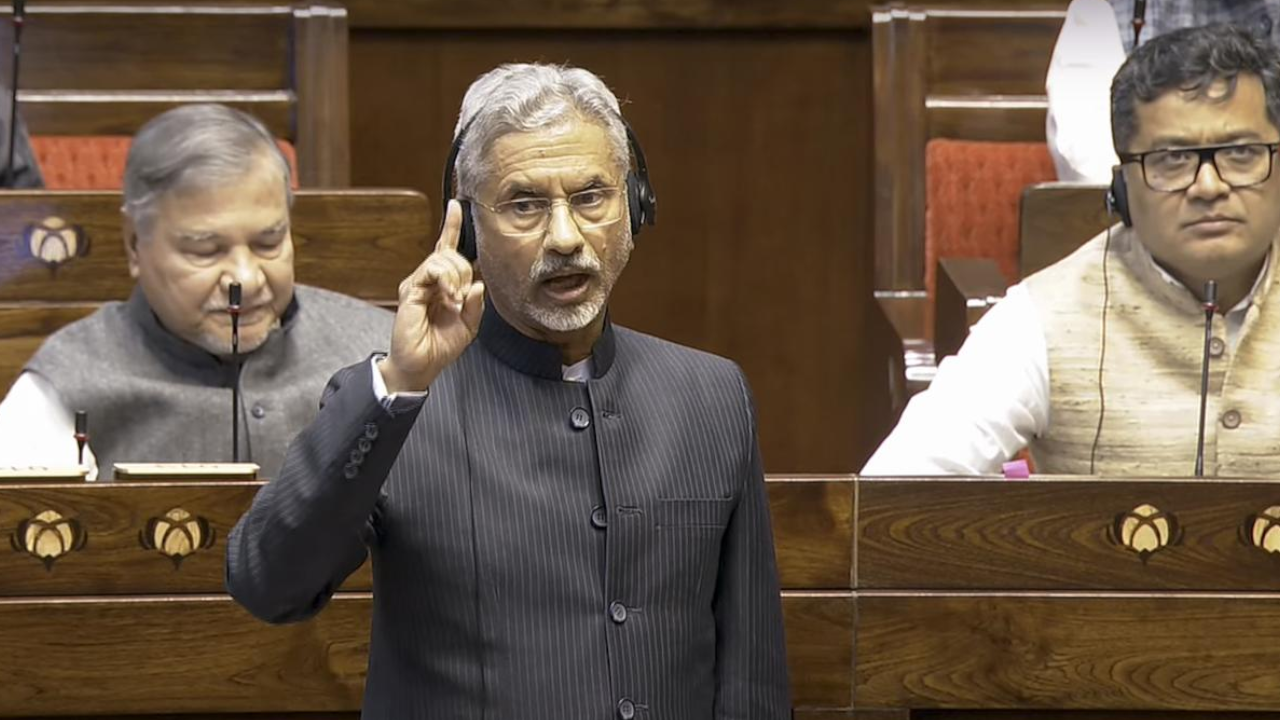40 Hours in Chains: The Harrowing Ordeal of Indian Deportees Under Trump’s Immigration Crackdown

White House shares images of migrants 'handcuffed, ankles shackled' being escorted onto military aircraft. (Photo: X/@PressSec)

Anie Anna Thomas
Published on Feb 11, 2025, 01:51 PM | 6 min read
“For 40 hours, we were handcuffed, our feet tied with chains, and not allowed to move an inch from our seats. After repeated requests, we were permitted to drag ourselves to the washroom. The crew would open the lavatory door and shove us in,” recalled Harwinder Singh, a 40-year-old from Tahli village in Punjab’s Hoshiarpur district. While responding to the media, he told The Indian Express. Singh was among the 104 Indians deported from the U.S. and returned to India on an American military aircraft on Wednesday, February 5, 2025, following President Donald Trump’s hardline stance on illegal immigration.
Also on the flight was 18-year-old Robin Handa, who arrived in Amritsar with his hands cuffed, feet bound with ropes, and face covered by a mask—a stark testament to the dehumanizing treatment endured during the journey.
As the deportees landed in India, details of their treatment began to emerge. Among the 104 Indians were 19 women and 13 minors, including a 4-year-old boy. All were subjected to 36 to 40 hours of restraint, with their hands shackled, feet bound, and faces masked throughout the flight. Reports indicate that the migrants were not unshackled even to drink water or use the washroom. A video released by the U.S. Border Patrol showed them shuffling in handcuffs and shackles—a treatment typically reserved for hardened criminals.
The Trump administration’s aggressive immigration policies, which have led to a sharp rise in mass deportations, have drawn global condemnation, particularly for the inhumane treatment of deportees. Upon taking office, Trump signed a series of executive orders aimed at expelling immigrants without permanent legal status, fulfilling a campaign promise to deport “record numbers” of people. His administration has pursued this agenda with a hardline approach, resulting in escalating deportations that have impacted countries worldwide. Many view these actions as a violation of human rights and basic decency.
A Global Crisis
With millions of undocumented immigrants facing the threat of removal, Trump’s policies have significant implications for countries like India, which has a large diaspora in the U.S. The administration has accelerated deportation efforts, expanding offshore detention facilities and entering controversial agreements with nations across Latin America and the Caribbean to outsource immigration enforcement and detention responsibilities. This shift in U.S. immigration policy has sparked harsh criticism both domestically and internationally. Human rights organizations and political leaders from affected countries have condemned the administration’s actions as inhumane and detrimental to global diplomacy.
The threat of deportation looms over approximately 1.4 million undocumented immigrants who once clung to the American dream. Reports suggest that nearly 700,000 Indian immigrants are currently living in the U.S. without legal documentation. For many, deportation represents an unexpected and devastating reality. Returning to their home countries, they face uncertain futures in economies that may not offer the opportunities they had sought. This crisis is not limited to Indians—people from across the globe are now confronting the same fate. A Gujarat native deported from US after she was brought to the Ahmedabad airport (Photo: PTI)
A Gujarat native deported from US after she was brought to the Ahmedabad airport (Photo: PTI)
Many of the deported Indian nationals had invested substantial sums—often through loans—on promises of legal entry into the U.S. Instead, they endured grueling, multi-country journeys orchestrated by human traffickers. Migrants from regions like Punjab, Haryana, and Gujarat—areas plagued by high unemployment and limited opportunities—often undertake perilous journeys, lured by the promise of economic prosperity in the U.S. However, their stories frequently take tragic turns upon arrival. Some face exploitation, while others find themselves trapped in a system that offers little support or chance for regularization.
Robin Handa’s father, a motor electrician, took out a loan of 30 lakh Indian rupees to send his son to the U.S. after he completed a Computer Science course at the Industrial Training Institute in Ambala. “My father pooled his savings of over 15 lakh from selling land and borrowed 30 lakh to pay an agent who promised to send me to the U.S. via the U.K., only for me to be chained like an animal and brought back to India,” Handa recounted. For him, the costly journey was a last resort after realizing there were no job opportunities in his hometown.
Harpreet Singh, a 29-year-old from Punjab, paid over $18,000 to traffickers to facilitate his entry into the U.S. His journey through dangerous terrain in Central America left him physically and emotionally scarred.
Global Backlash and India’s Response
The U.S. mass deportation policy has triggered widespread condemnation from countries, international organizations, and human rights groups. The use of military aircraft and the inhumane treatment of deportees have provoked strong objections. Colombia and Mexico, for instance, have refused to allow U.S. military planes to land on their soil, though they have permitted chartered flights for deported migrants. Colombian President Gustavo Petro criticized the U.S. for treating deportees as criminals, starting on January 26, “The U.S. cannot treat Colombian migrants as criminals.” Colombia later sent its own air force to escort its citizens back with dignity.
Similarly, Brazilian authorities condemned the use of handcuffs on deported citizens and intervened to have them removed. Mexico also rejected a U.S. military plane carrying 80 migrants on January 24, though it later allowed four government-chartered flights. Mexican President Claudia Sheinbaum emphasized that Mexico would always welcome its citizens back with respect and open arms.
In contrast, India has defended the use of restraints on its citizens, citing U.S. policy. The Indian government has supported the deportations. External Affairs Minister S. Jaishankar informed Parliament on February 6, 2025, that the deportation of illegal migrants was not a new development and that the use of restraints was “standard operating procedure.” External Affairs Minister S Jaishankar
External Affairs Minister S Jaishankar
Economic and Social Fallout
Aggressive deportations could have significant social and economic consequences, including family separations and labor shortages. The American Immigration Council has noted that mass deportations would be costly and could harm industries reliant on immigrant labor. Economists caution that removing undocumented workers could lead to labor shortages, driving up wages and prices. If the Trump administration intensifies its deportation efforts, the U.S. could lose millions of workers in sectors like construction, agriculture, and hospitality. Industry groups have warned that mass deportations could slow construction and increase the cost of new homes.
Humanitarian organizations emphasize the need for a fair and compassionate immigration policy that recognizes immigrants’ contributions while safeguarding their dignity and rights. The current situation underscores the urgent need for comprehensive immigration reform that balances enforcement with compassion and respect for human rights.










0 comments